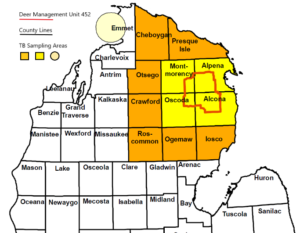Be a partner in disease surveillance; turn in deer heads for TB
Guest Writer: Phil Durst, MSU Extention and Ian Fitzgerald, MUCC Policy Assistant
Turning in the heads of deer taken is important for the management of Bovine Tuberculosis.
There is a critical need in December to meet the county level goals set by USDA in Northeast
Michigan. The help of every hunter and landowner is needed.
Hunting season may be winding down, but there is still important work to be done, and you can help. Michigan needs to have deer heads submitted for tuberculosis (TB) testing. This is a critical element of Bovine tuberculosis disease surveillance. “Knowing whether or not the disease has spread is vital to managing it’ says Phil Durst, of Michigan State University Extension .
The Michigan Department of Agriculture and Rural Development (MDARD) and the US Department of Agriculture  (USDA) work in partnership with the Michigan Department of Natural Resources (DNR) to establish surveillance quotas in order to detect changes in the occurrence of bovine TB in free-ranging white-tailed deer.
(USDA) work in partnership with the Michigan Department of Natural Resources (DNR) to establish surveillance quotas in order to detect changes in the occurrence of bovine TB in free-ranging white-tailed deer.
Under an agreement with the U.S. Department of Agriculture, Michigan must test at least 2800 deer heads from the Bovine TB Modified Accredited Zone (MAZ), that is, Alcona, Alpena, Montmorency, and Oscoda counties (area in yellow on the map). In addition, in each of the counties that border the MAZ (counties in orange on the map), 300 deer heads must be submitted for testing. The exception to that number is Presque Isle County, from which 500 must be tested.
If you have a deer hanging, or if you have further opportunities to hunt, submitting the head of the deer harvested is critically important. To submit a deer for testing, remove the head of the animal below the larynx and take it to a DNR Check Station or drop box ( www.michigan.gov/deercheck ). Wear disposable rubber gloves when field dressing, removing the head, and processing deer and follow best practices for carcass disposal to reduce the spread of disease.
At a drop box, be prepared to attach certain information with each deer head, including the contact information for the hunter, where and when the deer was killed, along with information about the deer (gender and adult or fawn).
A small number of game processors are assisting in collecting deer heads for TB testing, after receiving permission from the hunter/customer. If you take your deer to a processor, ask if they are participating. If not, encourage your processor to contact the DNR about how they can assist with head collection.
There are real consequences of not meeting the testing goals that reach beyond hunters and the health of the deer population. In each county where the goal is not met, whether, by little or much, all cattle herds must then be tested for TB over a three-year period. Testing will include all animals over 12 months of age and any purchased animals, no matter their age. This is both costly to the state and a major inconvenience to the farmers.
If you want to follow the numbers to see how a county is doing on meeting the goal for deer head submissions, the count is on mi.gov/bovineTB under “Data & Statistics” or click on: Deer test statistics .
If you have been issued a permit to remove deer from your property by the DNR, make sure all heads from those deer are submitted for TB testing.
More detailed reporting of bovine TB surveillance can be found at www.Michigan.gov/bovineTB
The post Be a partner in disease surveillance; turn in deer heads for TB appeared first on Michigan United Conservation Clubs.
Recent Posts



